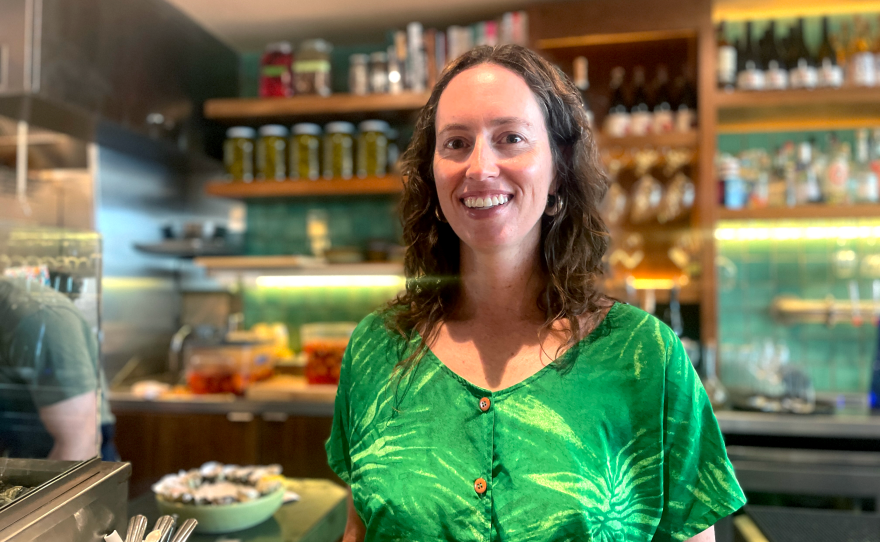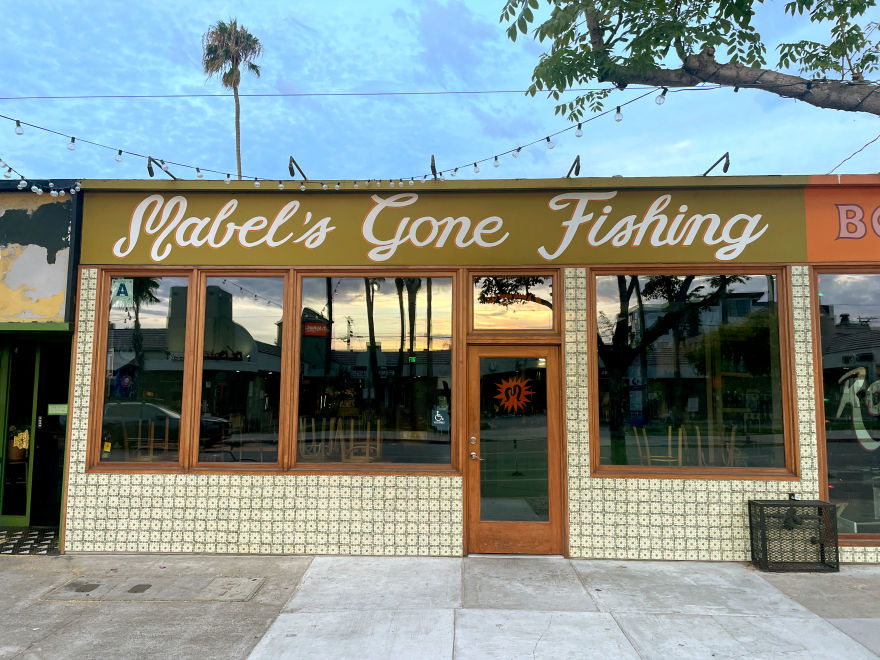Mabel’s Gone Fishing is more than a seafood restaurant in North Park — it’s a Michelin Bib Gourmand honoree that quickly became part of the neighborhood’s cultural fabric.
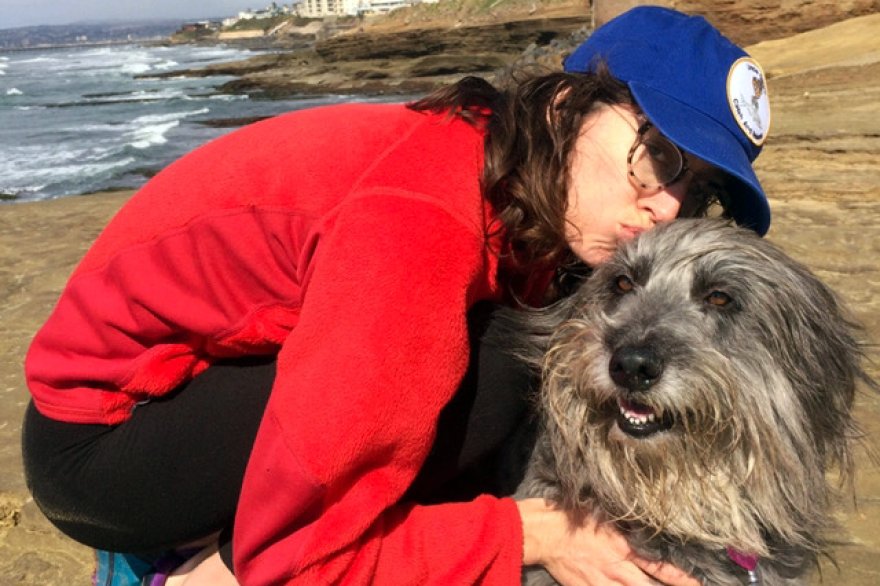
We meet co-owner Chelsea Coleman, whose family history includes longtime Padres announcer Jerry Coleman and a KPBS love story.
Together with her team, she has built a space that blends local ingredients, Spanish and Portuguese flavors and community-driven art into an experience rooted in San Diego. From honoring family traditions of scratch cooking to curating the Fishbowl gallery next door, Mabel’s shows how food, art and neighborhood spirit can come together to create something remarkable.
"Local is like all we have, ultimately, right?" Chelsea said. "Whether it be art, whether it be food, if we support each other in this small economy, we are so much stronger and better for it."
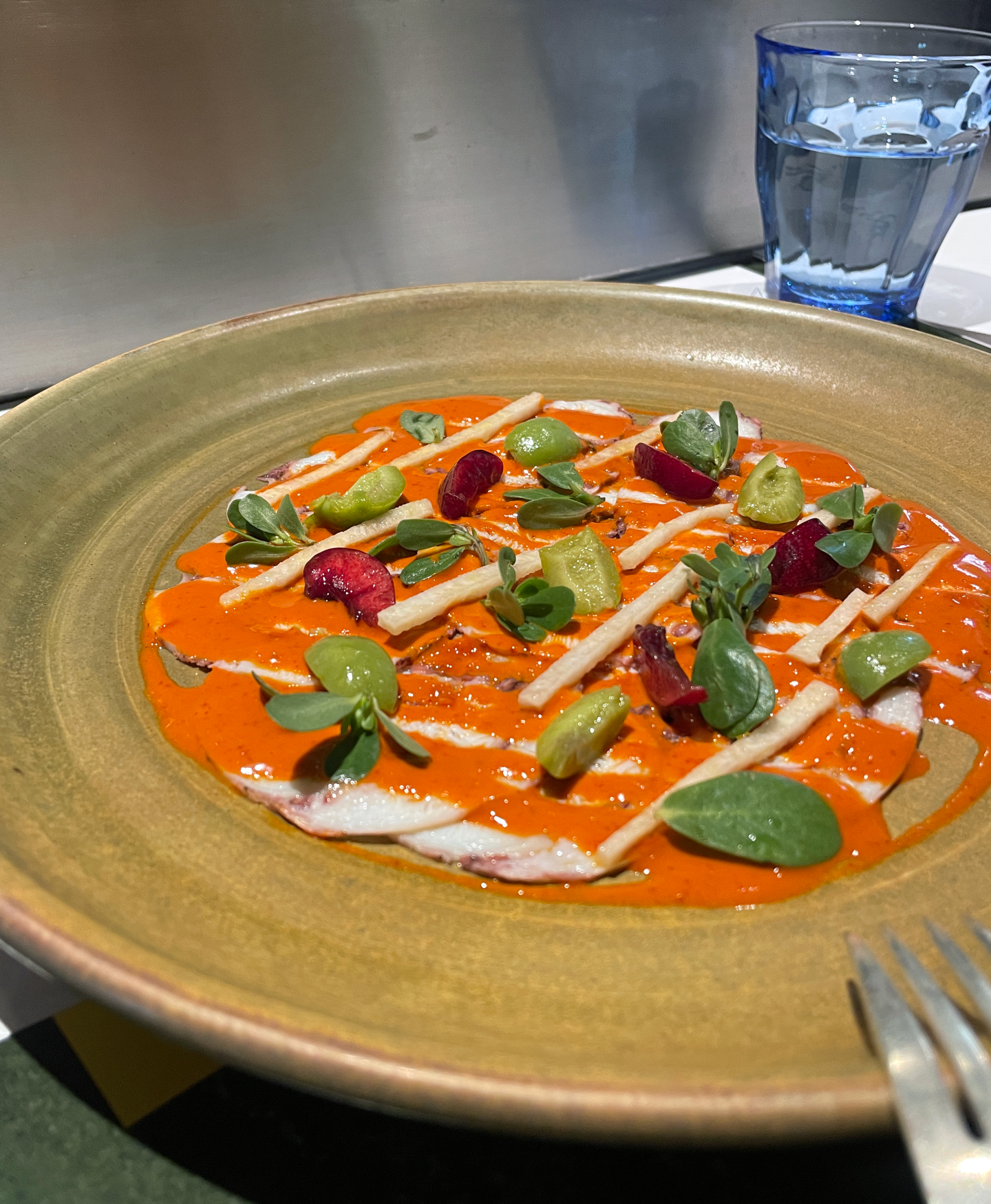
Thin slices of octopus meticulously prepared and topped with a complex chili-lime dressing, Castelvetrano olives, jicama, cherries and local purslane — every bite flavorful and perfectly balanced.
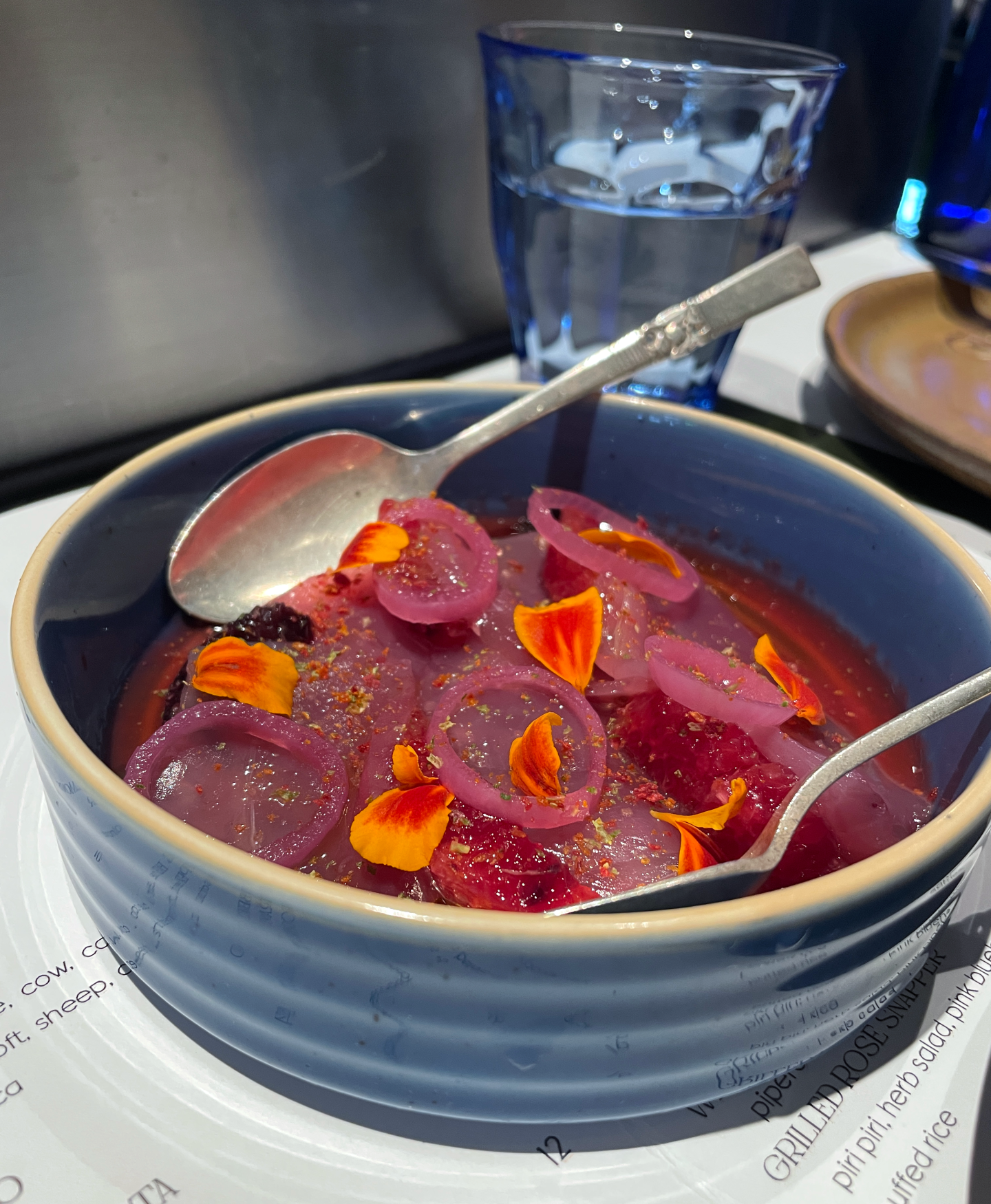
Line-caught bluefin served with pickled onions, blood orange, marigold flowers and a vibrant purple sauce made from dehydrated plum pulp. Mildly fruity, floral and summery.
Guests:
- Chelsea Coleman, co-proprietress of Mabel's Gone Fishing, The Rose Wine Bar, Secret Sister Sourdough Bakery + Tea House and Fishbowl
- Alejandra Frank, independent art curator
- Tanner Stanich, head chef of Mabel's Gone Fishing

Mentioned in this episode:
- Jerry Coleman | Chelsea Coleman's dad, longtime Padres broadcaster and former manager
- Tony Gwynn | Hall of Fame outfielder, "Mr. Padre" and one of the greatest hitters in baseball history
- Brucy Bochy | Former Padres manager who went on to win three World Series championships with the San Francisco Giants
- The Linkery | A pioneering farm-to-table restaurant in North Park that closed in 2014
- Chaparral | A native Southern California plant community that shapes San Diego's landscape and ecology
- Bread & Salt | Contemporary art gallery in Logan Heights housed in a former bread factory
- Scott Grewe | Culinary Director at Mabel's Gone Fishing
- David Leon | Chef at Michelin-starred Lilo in Carlsbad
- Fauna | Modern Baja cuisine restaurant in Valle de Guadalupe, named Best in Mexico by Latin America’s 50 Best Restaurants in 2023
- Shane Volberding | San Diego commercial fisherman, educator and advocate for local, sustainable seafood
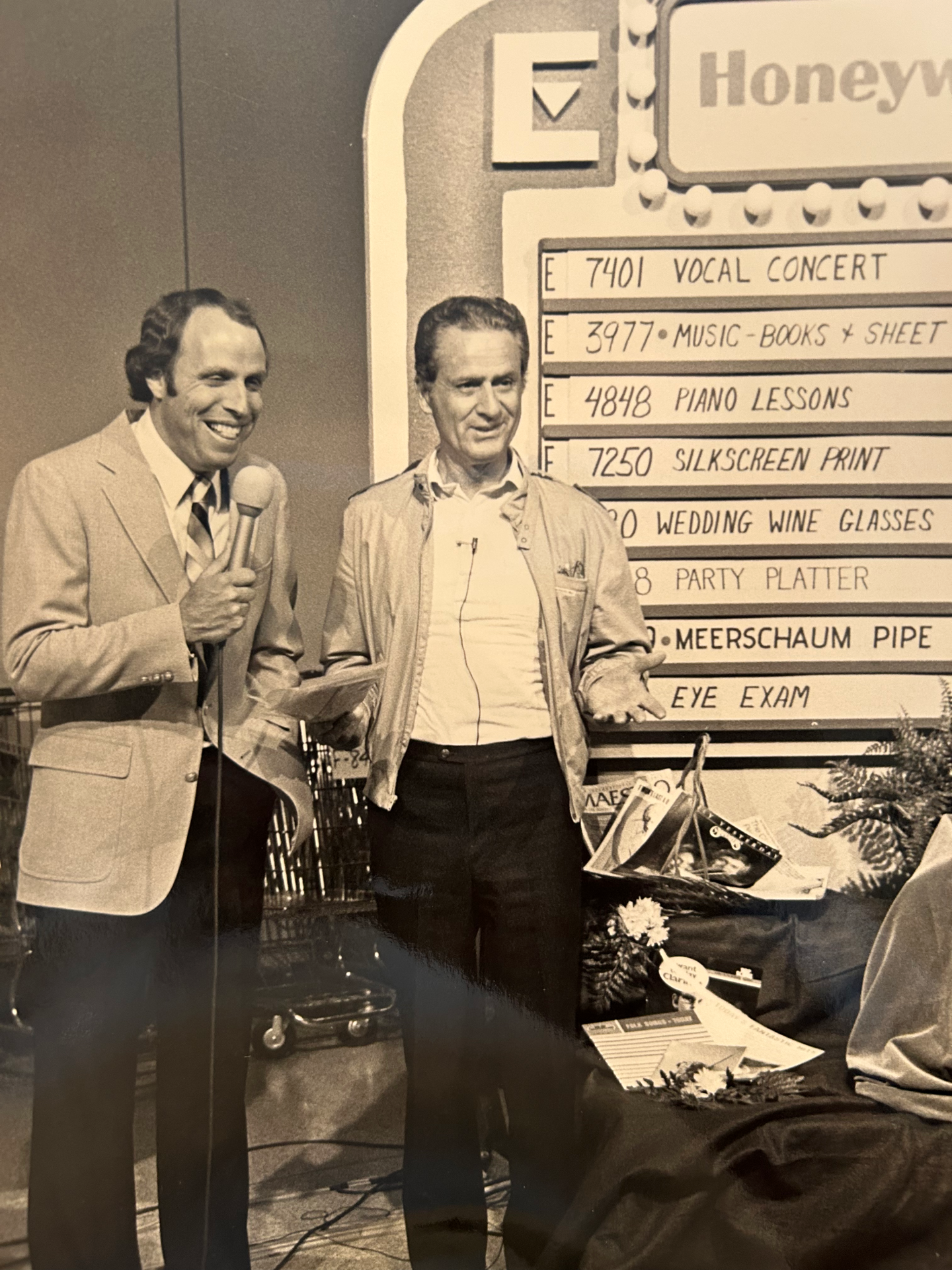
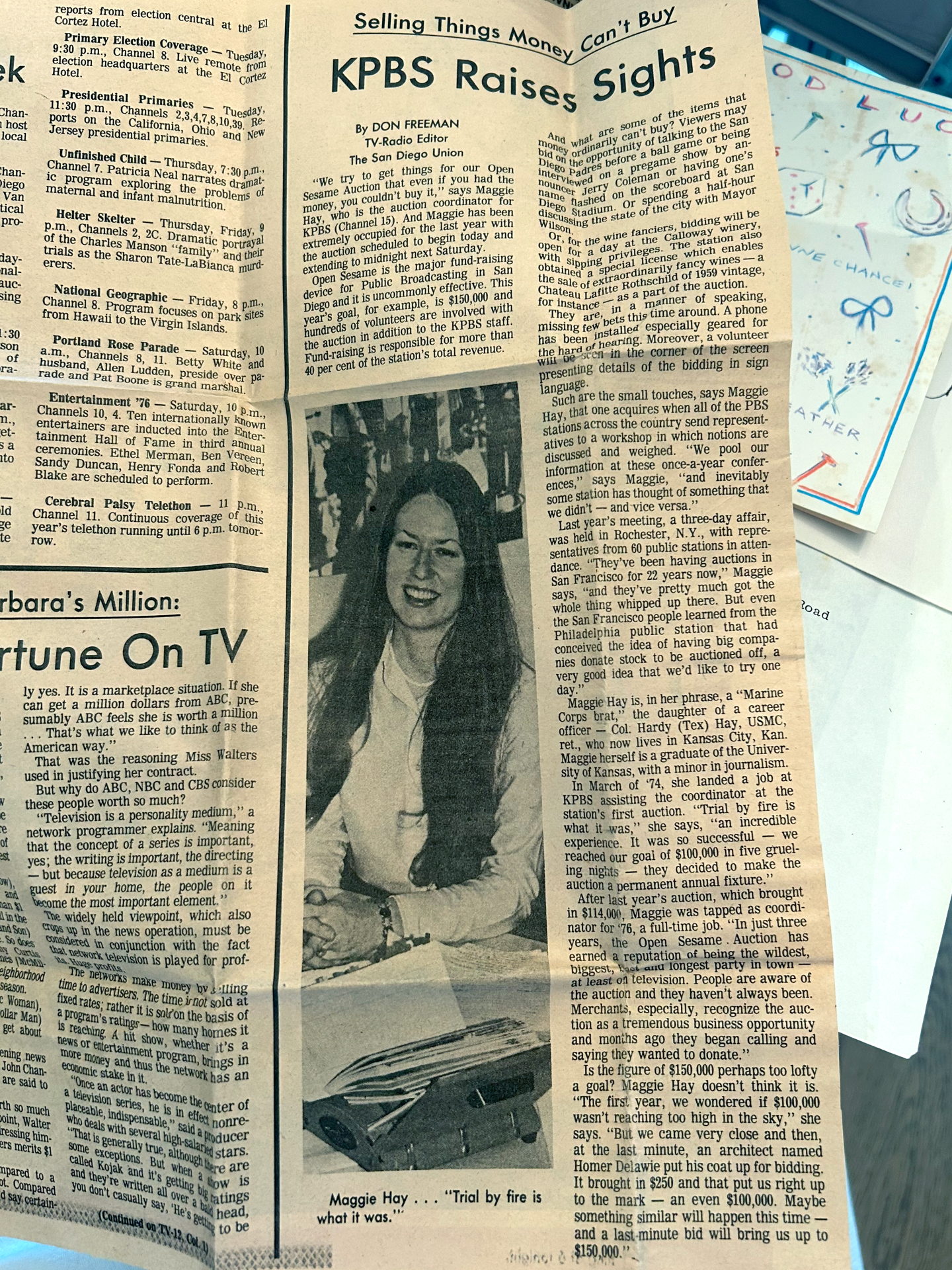
San Diego's Michelin-honored restaurants:
- Addison, Carmel Valley | Contemporary | 3 Stars
- Atelier Manna, Encinitas | Californian | Bib Gourmand
- Callie, East Village | Mediterranean | Bib Gourmand
- Cesarina, Point Loma | Italian | Bib Gourmand
- Ciccia Osteria, Barrio Logan | Italian | Bib Gourmand
- Cucina Urbana, Bankers Hill | Italian | Bib Gourmand
- Dija Mara, Oceanside | Indonesian | Bib Gourmand
- Jeune et Jolie, Carlsbad | French | Star
- Lilo, Carlsbad | Californian | Star
- LOLA 55, East Village | Mexican | Bib Gourmand
- Mabel's Gone Fishing, North Park | Seafood | Bib Gourmand
- Morning Glory, Little Italy | American | Bib Gourmand
- Soichi, University Heights | Japanese | Star
- Valle, Oceanside | Mexican | Star
Sources:
- What is a Michelin Star? (Michelin Guide, 2022)
- What Is The MICHELIN Bib Gourmand Award? (Michelin Guide, 2022)
- 1998 World Series recap (MLB.com, 2022)
- San Diego County Food Program (SanDiegoCounty.gov)
- From TV auctions to social media bidding: How the live shopping thrill lives on (Julia Dixon Evans and Anthony Wallace, The Finest, 2025)
- Selling Bluefin Tuna to Chefs (The Local Fish Project, 2023)
- CA Sea Grant informs new law to permit Fishermen’s Markets (Deborah Seiler, California Sea Grant, 2015)
- North Park's 'Mabel's Gone Painting' pairs local art with Michelin-recognized dining (Julia Dixon Evans, KPBS, 2025)
Episode 19: Mabel's Transcript
Julia Dixon Evans: There are just 14 restaurants in San Diego that have an official honor from what is arguably the most storied institution in food criticism, the Michelin Guide. And yes, it is the same Michelin as Michelin Tires. The guide started out as a tool for road trips. Michelin-starred restaurants are usually fancy and expensive, but the guide gives out the Bib Gourmand Award to restaurants with quote, exceptionally good food at moderate prices.
Today, we're visiting one of those spots with a remarkable and distinctly San Diegan story: North Park seafood restaurant Mabel's Gone Fishing. Mabel's received the honor less than a year after opening. It's an amazing achievement you might expect from a chef trained at the most prestigious culinary schools or from a family of fine dining royalty, but Mabel's owner Chelsea Coleman grew up in a household more focused on baseball than cooking elaborate meals every night. You might recognize her dad's voice.
Jerry Coleman: Drive left center field in the air coming on quickly Finley, Finley, Finely's got it and the Padres drape the National League flag around their shoulders for 1998. Oh, doctor!
Evans: That's Jerry Coleman, the longtime voice of the San Diego Padres and all-star second baseman for the Yankees. Chelsea's passion, though, was food.
Chelsea Chelsea Coleman: My grandpa grew up on a farm and he learned to cook everything from scratch, and he really is the one I credit with my love of food and cooking and real food.
Evans: It was at her grandparents' table where Chelsea began to shape the values she lives by now as a chef and restaurateur.
Chelsea Coleman: Everything that we do here is scratch cooking, which I… Like if I had a religion, that would probably be it. There is something spiritual almost in learning and handing down recipes and keeping that in your family and your traditions. It's rewarding. You feel like you've done a thing, you feel like you're honoring your ancestors.
Evans: At Mabel's, scratch cooking means no pre-chopped onions or pre-sliced potatoes.
Chelsea Coleman: In professional kitchens, you can do a lot of shortcuts like we don't buy egg yolks, and we try to buy as much as we can direct from farmers and farmers aren't selling egg yolks and egg whites, they're selling eggs.
Evans: The menu changes every season and anyone in the kitchen can nominate a dish for consideration, but…
Chelsea Coleman: … you have to hit two of these four requirements, which are locally sourced protein, locally sourced vegetables, Spanish or Portuguese traditional recipes or your personal soul food.
Evans: Earlier menus have included…
Chelsea Coleman: … my soul food with my grandpa. There were pickled peaches and country ham.
Evans: So we've got local ingredients, a scratch kitchen, soul foods, flavors of Spain and Portugal in San Diego: It's a winning formula. One producer Anthony got to taste for himself.
Anthony Wallace: This fish is amazing. I never had fish this good.
Evans: He described the fish as amazing four separate times. I promise there'll be more adjectives before the episode is over.
Wallace: It's definitely stressful to eat food in front of the chef because you don't want to have to pretend like you like it, but I didn't have to at all.
Evans: As we've explored previously on The Finest, it's hard just to keep a restaurant open. It's a lot harder to land in the city's top 14, according to Michelin, within the restaurant's first year. For reference, San Diego County has about 8,000 restaurants. So we wanted to know how Mabel's pulled it off. And just like the '98 Padres who reached the World Series, Mabel's is more than one star player.
Chelsea Coleman: Cooking in a kitchen is like the team sports of arts.
Evans: We talked to the 25-year-old San Diego-raised head chef that is behind the fish that wowed Anthony and the curator working with Chelsea to bring local artists into the restaurant and build a community space. Getting into the Michelin Guide may seem like a grand feat, but for Chelsea and her team at Mabel's, it's also pretty simple.
Chelsea Coleman: I just really believe in the space of the table and the physical act of making a meal and sharing a meal and having conversation over a meal. I wanted to go to a restaurant like this myself, and here we are.
Evans: From KPBS Public Media, this is The Finest, a podcast about the people, art and movements redefining culture in San Diego. I'm Julia Dixon Evans.
[Theme Music]
Evans: A few weeks before we visited Mabel's Gone Fishing, Chelsea Coleman and art curator Alejandra Frank came into the studio to talk about the restaurant's recent art programs. It's all part of what makes Mabel's a gathering place that enriches the community.
But first, let's go back to Chelsea's origin story because as it turns out, neither Mabel's Gone Fishing nor Chelsea Coleman herself would exist without KPBS and, coincidentally enough, the TV auctions we talked about in our last episode.
Chelsea Coleman: I just have to say I'm so excited to be at KPBS because this is where my parents met, so I wouldn't be here without this station.
Evans: They met how? What? Tape is running.
Chelsea Coleman: My mom was one of the early KPBS employees. She did all the fundraising and she got him to donate a night in the booth. And then I think my dad had a crush on her and started flirting with her. And here we are, here I am.
Evans: From 1972, before she was born, until his death in 2014, her dad, Jerry, was the lead radio broadcast announcer for the San Diego Padres, with a voice and catchphrase any local baseball fan would recognize.
Jerry Coleman: Oh doctor, you can hang a star on that baby!
Chelsea Coleman: He was as charming as he sounded on air. He was a wonderful dad.
Evans: She grew up around baseball, hanging out with Tony Gwynn's kids and going to Christmas parties where then-Padres manager Bruce Bochy dressed up as Santa.
Chelsea Coleman: So those are very fond memories and I remember running around with all the kids.
Evans: Did you ever play baseball?
Chelsea Coleman: I played softball, played through high school. I guess my dad watched a baseball game where I was, I missed a play and I think he told someone, well, it's time for voice lessons.
Evans: Oh wow, that’s lovely.
Chelsea Coleman: It was his humor. I don't take that personally.
Evans: At what point then did you start to realize that food might be your future?
Chelsea Coleman: Literally, when I was 7 years old, I used to force my friends to do restaurant night and we would print out menus and cook for our parents. It's been like my daydreams since I was a kid. It's what I love and I can't imagine doing anything else.
Evans: It was her grandparents' house where she really got her food education. There, it was always about making Southern food from scratch — a mentality rooted in life on a farm. And after college, Chelsea wanted to know more about farming.
Chelsea Coleman: So I was in Hawaii and I was in Argentina for like a combination of two years working on farms. And I really learned to appreciate organic agriculture and by extension viticulture because wine is a farmed product. You know, natural wine is really just the way wine has been made for centuries before we started doing things in labs. It's just sort of remembering the way it used to be done versus anything new, I would say.
Evans: When Chelsea came back to San Diego, she started working at The Linkery, a pioneering farm-to-table restaurant. That's where her belief in local food and natural wine solidified. Then, she worked at The Rose, a natural wine bar, eventually becoming part owner. She also launched a from-scratch sourdough bakery, Secret Sister. After that, the time was right for her to open a full-on restaurant. Step one? Come up with a name.
Chelsea Coleman: Initially, we were going to call it El Chaparral, which we decided was a little too unapproachable and not as fun, right? Like a little too serious, but we really wanted to create a restaurant that was of the space of the place, and chaparral is our coastal sage scrub biome here. So the idea was to use product of San Diego from the waters, from the canyons. We were hoping to have like a pretty big foraging portion, but we wanted it to be more fun, basically. And my dog Mabel loved the ocean. She loves swimming. I've seen very few dogs who do this, but she would dip her whole head and then throw her hair back.
Evans: So dramatic.
Chelsea Coleman: Yeah, very dramatic. But she just sort of became this caricature and it became fun to think about it in that way.
Evans: Chelsea and her team chose something playful, but their ideas about place remain front and center.
Chelsea Coleman: A big part of the mission with Mabel's is the fact that if you look at a picture of the coast of Spain and Portugal and you look at a picture of Torrey Pines, you have no idea which is which. We have the same environment, right? So we have the potential here to have a similarly rich dining culture, viticulture. We have the exact same conditions.
Evans: So there are the local ingredients — which we will return to and taste soon — but it's more than the food that is local. That's where art curator Alejandra Frank comes in.
Alejandra Frank: To me, it made so much sense to have beautiful, amazing, cool artwork in these spaces versus the normal things that you would come across of whatever people decide to put in restaurants.
Evans: Recently, the suite next door to Mabel's became available and Chelsea jumped on the chance to rent it out. Now it's called the Fishbowl, an art gallery and event space where you can hang out while waiting for a table or enjoying a drink. Alejandra curates rotating exhibitions featuring local artists, and she and Chelsea organize special dinners in the Fishbowl, where chefs, winemakers and artists collaborate around shared themes. It all comes back to Mabel's holistic commitment to the neighborhood.
Frank: Mabel's just has such a great community. There's people coming in, people purchasing art, and it's just speaking to a new audience as well. Over the past couple of years, I feel that there's been a lot of gallery spaces and community spaces that have opened up. I think that people realize how important it is and how we really need that right now. We want to be able to give our money and support the people that deserve it, that will continue to uplift and like pave the way for San Diego and creators.
Evans: Chelsea sees Mabel's as a whole as one big piece of art with all its many parts coming from San Diego's own region.
Chelsea Coleman: I feel like ultimately dining in a restaurant — if done well — the whole thing is art. When I think specifically to Mabel's, our light fixtures were done by a glassblower who's out of Bread & Salt. Our plates were hand thrown in Encinitas. It's all art. If it's a painting on the wall or if it's the dish that's beautiful in front of you constructed by a professional who's working really hard at their craft, that's all art.
Evans: And we all know where this vision and hard work led: a Michelin Bib Gourmand.
Chelsea Coleman: I mean, I think that was affirmation that what we were doing was excellent and appreciated and resonated, and tasted good because that's supposedly all that that's about is that the food is good. But I think that dining is so much more than just the food that I think it's impossible to separate that, so who knows. And also just being successful, it's a tough business and there's zero, there's negative guarantee that your restaurant is going to work when you put it out into the world. You know you're up against a lot. So that, we took a breath of relief in that moment, being like, oh, OK, great, like we're going to be OK.
Evans: For Chelsea, the food is just one part of the experience, but it's a delicious one.
Chelsea Coleman: We came up with company values and one of them was this idea that we know delicious. So if you work here, you have to really love food, you have to know what delicious tastes like.
Evans: After the break, we're going back to Mabel's to dig in ourselves and meet the surprisingly young chef behind it. Stay with us.
[Music]
Evans: Hey, can you say your name into the mic?
Tanner Stanich: Tanner Stanich. I've been the head chef here for about a year now at Mabel's Gone Fishing.
Evans: Tanner is just 25 years old. He started as a line cook, quickly rose through the ranks and now leads the kitchen. Being head chef at Mabel's is a big job, not just because of its acclaim but because the menu changes every season.
Stanich: We actually just changed the menu for the summer and it kind of forces change.
Evans: It's kind of like a band releasing four albums a year. They're constantly dreaming up the next season's menu and testing dishes out.
Stanich: We have an ongoing joke that whenever you go to bed and you wake up with an idea, you're straight to the Notes. Or it's like me and Chef Scott: we share a Google Sheet that we jot ideas in and we trade back.
Evans: I love that spreadsheets are involved. And from there, it's trial and error: cooking, tasting, giving feedback and adjusting.
Stanich: I don't think I've ever came up with a dish and the first one I played was the end product.
Evans: Anyone on staff can nominate a recipe for the menu as long as it fits two of Chelsea's four requirements: local protein, local produce, Spanish or Portuguese influence or personal soul food. So the menu changes as ingredients go in and out of season. The first dish we tried had local veggies and proteins, and it's probably on its way to becoming one of Tanner's soul foods.
Stanich: Personally, octopus, the carpaccio on right now is something that really I love to cook. Octopus is something my sous chef, David Leon, who works at Lilo in Carlsbad, he taught me how to cook it and it's always been something that I really enjoy doing. This is probably my favorite dish on the menu right now.
Evans: Because I don't eat meat, I passed all the seafood-eating duties to Anthony — extra work he was happy to take on. Neither one of us had ever seen octopus presented this way. It's far from its natural tentacly appearance.
Stanich: It's cooked and then it's wrapped in Saran wrap super tight so it sticks to itself, and then you freeze it so that you can slice it nice and thin, almost like it was…
Wallace: Almost like a deli meat.
Stanich: Exactly. It would be like a stick of provolone like when you're working at Jersey Mike's.
Evans: A flat slice of octopus at the base, orange chili dressing blanketing everything, purslane with its tiny juicy succulent leaves, jicama strips and cherries and olives sprinkled evenly on top — like a precisely topped pizza where every slice gets the same bite. Everything at Mabel's is designed for sharing.
Chelsea Coleman: The octopus we try to get from Baja when we can. Occasionally, it does come from Spain. The cherries I don't think they're any further north than Santa Barbara. The purslane is local. I don't know if you guys have ever seen purslane in your garden. It's like you can, it's a very fancy ingredient, but it grows like a weed in San Diego.
Evans: We can only imagine how many iterations it took to reach this delicate balance.
You want me to hold the mic for you while you try this?
Wallace: All right, so I need to have a live reaction.
Evans: Yeah.
Wallace: That's good.
Evans: OK, what are you tasting? What are you feeling?
Wallace: It is very flavorful. It's acidic, it's spicy. It does kind of taste like deli meat actually. It kind of tastes like salami weirdly — not that you understand any of these references, but it's really good. Let me have another one.
Evans: It's all yours.
Stanich: Feel free to give me some notes too if you guys don't like anything. It's a brand new menu.
Wallace: I have no notes on this one.
Stanich: Thank you. Very Baja-like cuisine inspired. I think that's my favorite food to eat. The best meal I've probably ever had was a restaurant called Fauna in Valle de Guadalupe. I think I draw a lot of inspiration from that type of cuisine and I'm trying to mesh the cultures of Spanish food, Baja cuisine and also San Diego ingredients kind of all be in the middle.
Wallace: What cheap simple dish do you make the most for yourself?
Stanich: I probably eat a grilled cheese probably at least twice a week. Yeah, especially with pickles in it.
Evans: Do you have it with a soup?
Stanich: Yes, I used to love making tomato soup and just dipping it, but the late hours or the long nights, it's just I can't make soup right now. I have a George Foreman grill at home that my mom gave me like a long time ago. I just throw some Secret Sister sourdough in there and some American cheese and get at it.
Evans: But Tanner goes out to eat too, every so often. And before he started working here, Mabel's was his favorite restaurant.
Stanich: Me and my girlfriend used to come in, I think we came in like 10 times before I started working here, and then I was like, I finally had to do it. Like, I got to put my resume in and they took me in.
Evans: Why are you working in food?
Stanich: When I started working in food, it was because I was drawn to the atmosphere. It's not the highest-paying job for how hard you do work and the late hours, but something about that grittiness and that rock-star mentality of playing with knives and fire is just so much fun. But then I think it grew into more of like, I get to be creative — and you build a family. I see these people more than anyone I know, and it's just the camaraderie of working side by side with someone — cooking, sweating and grinding it out.
Evans: That's really the heart of the place. It feels like family, and as much as they possibly can, Mabel's works with people they know in the community — from the artists to the food producers, local farmers and fishermen supplying ingredients.
Our second dish was all about Shane, the fisherman. It's a bluefin tuna, but, again, looked like nothing we'd seen before — something otherworldly. Pickled onions, blood orange, vivid marigold flowers: all drenched in a bright purple plum sauce Tanner invented by dehydrating plum pulp, partly as a way of mitigating food waste.
Stanich: But I don't think anybody's ever done like a lacto-fermented plum tajín. It feels like everything's been done.
Wallace: There's still new foods out there.
Stanich: Yeah, I guess that's the challenge.
Evans: But of course, the standout was the bluefin tuna.
Chelsea Coleman: So that is from a local fisherman named Shane. He mostly does our mackerel, but he's fishing bluefin right now and that's line-caught bluefin.
Wallace: It's like tuna migrate and so you don't know when they're going to be here? And they're here right now?
Chelsea Coleman: Yes, there's a lot of amazing tuna fishermen in San Diego. We have such a cool tuna fishing history here in San Diego, too, and only in the last 10 to 15 years has direct-from-the-boat to restaurants or to consumers been kind of possible. A lot of seafood used to leave San Diego before it came back or get shipped overseas, but there's been a really cool resurgence in local fisheries.
Evans: It's wild to think that not long ago, if you wanted San Diego-caught tuna at a San Diego restaurant, it had to first be sent away, then shipped back. In a world where industrial food shipped globally has become the norm, Mabel's approach feels innovative, but it's really just back to basics — old school, using stuff from local farmers and cooking everything from scratch. And with the tuna, you can taste the difference.
Wallace: This fish is amazing. I feel like this tastes like how it looks: mildly fruity and floral, but it's very refreshing, it's very summery. People say it melts like butter in your mouth and it's really true.
Evans: It was a good day at the office for Anthony.
Wallace: I'm done. I ate it all. It was amazing.
Evans: Mabel's Gone Fishing is food, art, creativity and community. A place to relax Spanish-style after a long day, a World Series-caliber team.
Jerry Coleman: It's gone! Homerun, Garvey!
Evans: But whatever you call it, however you think of it, it's a thing that feels like it could only exist here in San Diego.
Chelsea Coleman: Local is like all we have, ultimately, right? Whether it be art, whether it be food, if we support each other in this small economy, we are so much stronger and better for it. I just think it's a great way to create community, ultimately, and in times where it can feel like everything's so fractured, that's a really great way to do it.
Evans: A special thank you to Chelsea Coleman, Alejandra Frank, Tanner Stanich and the entire team at Mabel's Gone Fishing for their help with this episode. You’ve only got a few more weeks before the fall menu drops.
Next week on The Finest, Anthony and I take a look back at some of the episodes we’ve done so far, share some updates and highlight places you can check out some of the artists we’ve met along the way.
I'm your host, Julia Dixon Evans. Our producer, lead writer and composer is Anthony Wallace. Our engineer is Ben Redlawsk and our editor is Chrissy Nguyen.
This transcript has been edited for clarity and conciseness.
From KPBS Public Media, The Finest is a podcast about the people, art and movements redefining culture in San Diego. Listen to it wherever you get your podcasts or click the play button at the top of this page and subscribe to the show on Apple Podcasts, Spotify, Amazon Music, Pocket Casts, Pandora, YouTube or wherever you get your podcasts.
Have feedback or a story idea? We'd love to hear from you. Email us at thefinest@kpbs.org and let us know what you think.


